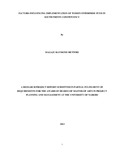| dc.contributor.author | Magaju, Raymond M | |
| dc.date.accessioned | 2013-08-12T12:58:08Z | |
| dc.date.issued | 2013 | |
| dc.identifier.citation | Magaju Raymond Mutwiri. 2013. Factors Influencing Implementation Of Women Enterprise Fund In South Imenti Constituency. A Research Project Report Submitted In Partial Fulfilment Of Requirements For The Award Of Degree Of Master Of Arts In Project Planning And Management At The University Of Nairobi. | en |
| dc.identifier.uri | http://erepository.uonbi.ac.ke:8080/xmlui/handle/123456789/55924 | |
| dc.description.abstract | As a result of our weak economic growth rate, the government has not been able to adequately create jobs to its ever increasing population and more so the women. This has therefore led to women coming with innovative ways of creating employment for themselves and others through enterprise development. The sizes of women owned businesses seem to fail or remains the same throughout. The aim of the study was to examine how effectively fund had been implemented in South Imenti Constituency and identify key result areas that if improved could lead to consequent success. The objective of the study was to examine the challenges encountered in the implementation of the W.E.F. The study design was a descriptive survey study. The sample population was 51 women group leaders funded under C-WES. Data was collected using questionnaires with open-ended and closed–ended questions. Data collected was analyzed using SPSS windows version 17. Results were presented in percentages, frequency tables and cross tabulations. The study established that was an association between educations on entrepreneurship on implementation of WEF. The study also established that 65.3% of those groups that had received additional training on entrepreneurship education were able to invest the amount borrowed with success. Only 34.7% of these were not able to invest this amount borrowed with success. The study established that 68.8% of those women groups that had received some form business support services claimed that the implementation of WEF has been a success as far as their group was concerned. The study noted that 55.6% of the women beneficiaries in South Imenti Constituency from WEF believed that the WEF was a success. Generally, we note that irrespective of what determines the amount of money loaned to the group members, they feel that WEF had been a success. Thus one cannot associate the success of WEF in South Imenti to the determinants of the loan size. All those respondents who felt that their lives had not changed positively after receiving WEF believed that the funding was sufficient. We thus note an association between the amounts loaned to the groups and its eventual success. Recommendation for further studies as follows; the beneficiaries of WEF should be well trained on the management and use of finances as the study has associated the success of WEF to proper training, we suggest further study to be carried out to establish whether the amount of money given to individual members in the group determines the success of the WEF. This is because the study found that those members who claim that the amount of money given to individual members in the group depended on individual member savings, and finally we suggest a review of the current eligibility criteria for group to qualify for a loan to factor in the issue of whether the amount borrowed would be able to meet the intended purpose as this has been found to affect the eventual success of WEF in South Imenti constituency. | en |
| dc.language.iso | en | en |
| dc.publisher | University of Nairobi, | en |
| dc.title | Factors influencing implementation of Women Enterprise Fund in South Imenti Constituency | en |
| dc.type | Thesis | en |
| local.publisher | Department of Education Administration & Planning | en |

